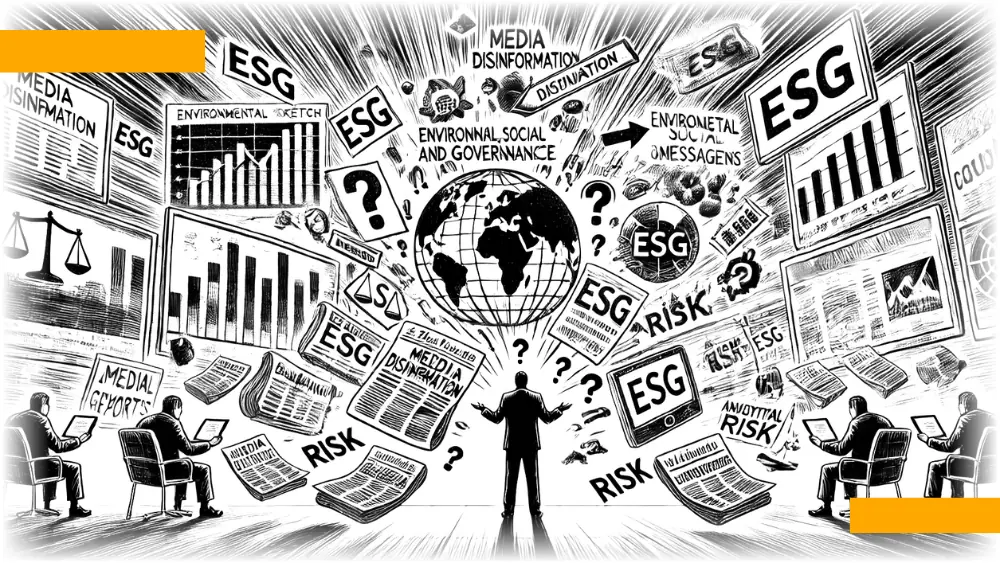 illustration: DALL-E
illustration: DALL-EThat`s not fringe talk. It`s mainstream. Poland ranks 11th globally for greenwashing mentions in major online news sources.
Critics allege that as many as 42% of ESG-related claims are misleading. They accuse firms of selective transparency - flaunting eco-friendly highlights while burying environmental shortcomings. It`s a trust issue. When nearly 90% of surveyed business representatives admit they lack proper ESG knowledge, opponents weaponize this to discredit entire reporting efforts.
As Sebastian Bykowski, IMM’s Vice President warns, disinformation undermines all companies - even those genuinely trying to improve. The chaos is fueled by social media algorithms and generative AI, which amplify controversy and allow fake content to spread at warp speed.
From compliance to confusion - ESG’s growing pains
Despite ESG being enshrined in EU’s Omnibus Directive - binding on firms with over 1,000 employees and €50M+ in revenue or €25M in assets - 45% of companies still don’t know if it applies to them. Meanwhile, media attention is exploding: from 14,600 ESG-related mentions in Q1 2024 to 23,100 in Q1 2025. That’s a 58% leap.
There were 70 ESG-themed events in the last quarter alone, 90% of them free. Yet this informational boom has not translated into widespread understanding. Instead, it created a perfect storm for disinformation to thrive.
The ESG and the ideological skirmish
ESG has become a political football. Both the far left and right now weaponize it for ideological gain. Add to that a media environment dominated by clickbait and vague headlines, and what you get is confusion instead of clarity - skepticism instead of progress.
According to the 19th edition of the "Global Risks Perception Survey", fake news is now considered among the leading threats to global stability. For ESG-driven firms, the consequences are real: lost trust, legal exposure, reputational crises, talent drain, falling brand value - and potentially, existential danger.
IMM’s report "Disinformation about ESG in the media. Facts and myths" was unveiled at the Grand ESG conference by Fundacja Grand Press on May 9, 2025. Download the full report here.
How the media talk (or stay silent) about climate
The report "Climate Change and News Audiences 2024", published earlier this year by Reuters Institute, shows that audience engagement with climate topics has remained almost unchanged for several years.
Climate misinformation remains a significant issue. Interestingly, misinformation sources vary widely, with politicians and celebrities among the most frequently indicated.
| Source of Misinformation | Percentage of Respondents |
|---|---|
| Politicians and political parties | 12% |
| Governments | 11% |
| Celebrities | 10% |
| Climate activists | 10% |
| Scientists | 8% |
| International institutions | 8% |
| Energy companies | 8% |
| Friends and family | 7% |
| Charitable organizations | 6% |
| Religious leaders | 6% |
The problem is not only the emergence of false content but also its dissemination by public figures and influential groups. The high number of mentions of politicians and celebrities as misinformation sources shows that major media players are not always responsible for misleading the public.
COMMERCIAL BREAK
New articles in section Media industry
Children and communication with machines. Experiment by SWPS researchers
SWPS
How do primary school students treat humanoid robots? Researchers from SWPS University have shown that in most cases, children relate to robots politely, and younger children and girls more often perceive them as possessing human characteristics.
Streaming platforms in Poland. What criteria determine the choice
Paweł Sobczak
Price, indicated by 54.2% of respondents, and subject matter (54% of indications) are the most important factors influencing users' choice of content on streaming services. The service brand is mentioned by 18.1% of those surveyed.
Yellow Badge. Jan Bluz's documentary on political prisoners in Belarus
BARD
Imagine writing three posts on a social networking site. For a few clicks on a keyboard, you get three years in a penal colony. Sounds like a grim joke? For political prisoners in Belarus, this is the reality that Jan Bluz shows in the documentary "Yellow Badge", produced with the support of the Pulitzer Center.
See articles on a similar topic:
Artificial Intelligence is ALREADY Outperforming Humans in Creativity
Krzysztof Fiedorek
ChatGPT, an AI model based on the GPT-4 engine, achieved better results than the vast majority of students in the standard Torrance Test of Creative Thinking (TTCT), which evaluates creativity. The study was conducted by researchers from the University of Montana.
Media in the Balkans and Turkey
Michał Kuźmiński
The Balkans have long been referred to as a “melting pot,” and for good reason. This region is highly diverse and quite unstable. Consequently, the media landscape here is varied as well. In some places, such as democratic Greece, a member of the European Union, the media market is stable and easy to navigate.
Artificial Intelligence in the Media. Reuters Digital News Report 2024
Krzysztof Fiedorek
AI has gained prominence in recent years, and its application in producing, distributing, and presenting news content continues to grow. However, this development is met with mixed feelings by audiences, which has significant consequences for media trust and its future.
Russian Propaganda. Debunk.org Report on Moscow's Disinformation Scale
BARD, PAP Mediaroom
In 2022, the Russian Federation allocated approximately 143 billion rubles to mass media (equivalent to 1.9 billion US dollars), exceeding the planned budget by 25%. For the current year, the Kremlin's budget for this sector is set at 119.2 billion rubles (1.6 billion dollars).





























